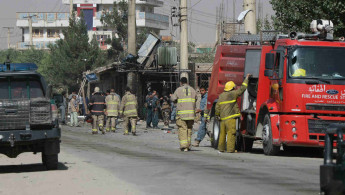Five dead in suicide attack on Afghan intelligence convoy
A suicide blast targeting an intelligence convoy killed at least five people and wounded six more in Afghanistan on Thursday, local police said.
The Taliban claimed responsibility for the attack on the National Directorate of Security (NDS) in Kabul, which police spokesman Hashmat Stanikzai said happened at 5am local time.
Four members of the NDS and a civilian were killed, while five NDS personnel and a civilian were wounded.
The attack comes two days after five rockets struck a residential area of Kabul, wounding at least three people. There was no claim of responsibility.
And on Sunday, a suicide bomber blew himself up near Kabul international airport, killing at least 23 people. A further 107 people were wounded.
That attack was claimed by the Islamic State group, which said it had targeted Afghan Vice President Abdul Rashid Dostum, who returned to Kabul after more than a year in exile.
Taliban and IS militants have repeatedly carried out deadly attacks in the Afghan capital, turning it into one of the most dangerous places in the country.
Twitter Post
|
In October, Afghanistan plans to hold years-delayed elections while its security forces struggle to get the upper hand on the battlefield and prevent civilian casualties.
Security is a major concern in the war-torn country, with the Taliban and other militant groups controlling large swathes of territory.
Many Western and Afghan officials expect 2018 to continue to be a particularly bloody year.
Earlier this month, the UN released a report showing a record number of civilians killed in the first six months of 2018, with militant attacks and suicide bombs the leading causes of death.
The toll of 1,692 fatalities was one percent more than a year earlier and the highest for the period since the United Nations Assistance Mission in Afghanistan (UNAMA) began keeping records in 2009.
The record death toll came despite an unprecedented ceasefire by Afghan security forces and the Taliban last month that was largely respected by both sides, UNAMA said.
Fighters on both sides have expressed a deep fatigue with the grinding conflict, raising hopes that an end to hostilities was possible after 17 years of war that began with the US-led invasion in 2001 that ousted the Taliban from power.
But the insurgents refused the government's request to extend their three-day ceasefire, launching attacks that have seen scores killed or injured.
Agencies contributed to this report.
Follow us on Twitter: @The_NewArab





 Follow the Middle East's top stories in English at The New Arab on Google News
Follow the Middle East's top stories in English at The New Arab on Google News


